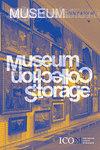新冠肺炎大流行与人类世对博物馆的不可逃避的挑战
IF 0.4
4区 艺术学
0 ART
引用次数: 1
摘要
摘要若干指标表明,新冠肺炎大流行提高了公众对气候和环境紧急情况的认识,并扩大了全球对自然系统及其各个组成部分相互依赖性的认识。这些趋势加在一起,人们越来越意识到环境破坏和社会不公正,2019年的气候罢工和2020年的“黑人的命也是命”抗议活动引起了全球的广泛关注。博物馆如何利用这种新的社会和活动家氛围,因为我们重新摆脱了与疫情相关的健康和安全措施带来的严重限制?人类世的概念是新冠肺炎危机期间和之后博物馆可以利用的最强大、最具包容性的主题,以重塑其与新公民身份的关系。在这篇文章中,我将借鉴我在意大利科学博物馆的工作和经验,就整个博物馆界迫切需要根据人类世范式审查博物馆政策和活动进行一些讨论,博物馆必须在这一过程中进行彻底的内部战略变革。一个对几项博物馆活动产生普遍影响的关键问题是,需要将我们的故事从人类对抗自然的叙事(20世纪的环保主义观点)转变为人文对抗(其他)人文的叙事,它更恰当地描述了当前人类世时代不同价值观和伦理原则之间关于我们星球本体论地位的冲突。此外,最重要的是,博物馆需要越来越意识到自己在社会中的政治作用,并准备好比我们的惯例更能体现这一点。如果对《联合国2030年议程》的承诺尊重了博物馆的机构任务,那么就人类世问题进行批判性辩论的提议将成为希望在新冠肺炎后世界中发挥其社会和政治作用的博物馆面临的主要挑战。本文章由计算机程序翻译,如有差异,请以英文原文为准。
The Covid-19 Pandemic and the Inescapable Challenge of the Anthropocene for Museums
Abstract Several indicators suggest that the Covid-19 pandemic has raised public awareness around climate and environmental emergencies, and expanded global consciousness around the interdependencies of natural systems and their individual components. These trends add up to a growing awareness of both environmental damage and social injustices, brought to wide global attention by the 2019 Climate Strikes and the ‘Black Lives Matter’ protests of 2020. How can museums take advantage of this new social and activist climate, as we resurface form the severe limitations imposed by pandemic-related health and safety measures? The concept of the Anthropocene stands out as the most powerful, all-inclusive topic that museums can leverage to reshape their relationship with a new form of citizenship during and following the Covid-19 crisis. In this article, and drawing on my work and experiences at the MUSE – Science Museum in Italy, I will offer some discussion around the urgent need, for the entire museum community, to review museum polices and activities in light of the Anthropocene paradigm, a process that museums must undertake thorough a complex process of internal strategic change. One key issue with pervasive consequences over several museum activities is the need to shift our storytelling from the humanity-against-nature narrative (a 20th-century environmentalist view) to a humanities-against-(other)-humanities narrative, which more properly describes the current Anthropocene-era conflict between different values and ethical principles with regard to the ontological status of our planet. Moreover and above all, museums need to become increasingly aware of their political role in society, and be prepared to assert it more than is customary in our practices. If the commitment to the United Nations 2030 Agenda honours the institutional task of museums, the proposal for critical debate on Anthropocene issues stands out as the main challenge for museums who wish to fulfil their social and political roles in a post-Covid-19 world.
求助全文
通过发布文献求助,成功后即可免费获取论文全文。
去求助
来源期刊

MUSEUM INTERNATIONAL
ART-
CiteScore
0.60
自引率
0.00%
发文量
0
期刊介绍:
In its new revised form Museum International is a forum for intellectually rigorous discussion of the ethics and practices of museums and heritage organizations. The journal aims to foster dialogue between research in the social sciences and political decision-making in a changing cultural environment. International in scope and cross-disciplinary in approach Museum International brings social-scientific information and methodology to debates around museums and heritage, and offers recommendations on national and international cultural policies.
 求助内容:
求助内容: 应助结果提醒方式:
应助结果提醒方式:


